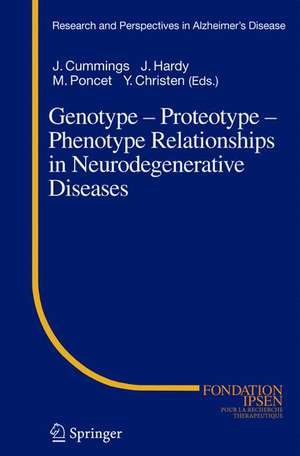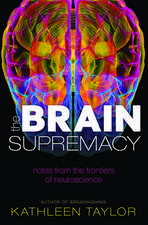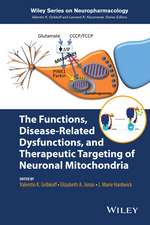Genotype - Proteotype - Phenotype Relationships in Neurodegenerative Diseases: Research and Perspectives in Alzheimer's Disease
Editat de J. Cummings, J. Hardy, M. Ponceten Limba Engleză Hardback – apr 2005
| Toate formatele și edițiile | Preț | Express |
|---|---|---|
| Paperback (1) | 939.14 lei 43-57 zile | |
| Springer Berlin, Heidelberg – 19 oct 2010 | 939.14 lei 43-57 zile | |
| Hardback (1) | 943.57 lei 43-57 zile | |
| Springer Berlin, Heidelberg – apr 2005 | 943.57 lei 43-57 zile |
Din seria Research and Perspectives in Alzheimer's Disease
- 18%
 Preț: 1833.48 lei
Preț: 1833.48 lei - 18%
 Preț: 943.73 lei
Preț: 943.73 lei - 5%
 Preț: 1094.80 lei
Preț: 1094.80 lei - 18%
 Preț: 957.13 lei
Preț: 957.13 lei - 24%
 Preț: 1035.48 lei
Preț: 1035.48 lei - 18%
 Preț: 941.82 lei
Preț: 941.82 lei - 18%
 Preț: 1216.48 lei
Preț: 1216.48 lei - 18%
 Preț: 1211.74 lei
Preț: 1211.74 lei - 18%
 Preț: 937.58 lei
Preț: 937.58 lei - 5%
 Preț: 707.33 lei
Preț: 707.33 lei - 5%
 Preț: 716.09 lei
Preț: 716.09 lei - 5%
 Preț: 711.32 lei
Preț: 711.32 lei - 15%
 Preț: 636.30 lei
Preț: 636.30 lei - 5%
 Preț: 707.86 lei
Preț: 707.86 lei - 5%
 Preț: 712.60 lei
Preț: 712.60 lei - 5%
 Preț: 711.52 lei
Preț: 711.52 lei - 5%
 Preț: 712.25 lei
Preț: 712.25 lei - 15%
 Preț: 631.86 lei
Preț: 631.86 lei - 5%
 Preț: 707.50 lei
Preț: 707.50 lei - 15%
 Preț: 639.08 lei
Preț: 639.08 lei - 18%
 Preț: 938.51 lei
Preț: 938.51 lei - 5%
 Preț: 365.99 lei
Preț: 365.99 lei - 15%
 Preț: 636.30 lei
Preț: 636.30 lei - 5%
 Preț: 367.84 lei
Preț: 367.84 lei - 15%
 Preț: 635.80 lei
Preț: 635.80 lei - 18%
 Preț: 1211.90 lei
Preț: 1211.90 lei
Preț: 943.57 lei
Preț vechi: 1150.70 lei
-18% Nou
Puncte Express: 1415
Preț estimativ în valută:
180.55€ • 188.99$ • 150.28£
180.55€ • 188.99$ • 150.28£
Carte tipărită la comandă
Livrare economică 31 martie-14 aprilie
Preluare comenzi: 021 569.72.76
Specificații
ISBN-13: 9783540248354
ISBN-10: 3540248358
Pagini: 184
Ilustrații: XIII, 166 p.
Dimensiuni: 155 x 235 x 17 mm
Greutate: 0.39 kg
Ediția:2005
Editura: Springer Berlin, Heidelberg
Colecția Springer
Seria Research and Perspectives in Alzheimer's Disease
Locul publicării:Berlin, Heidelberg, Germany
ISBN-10: 3540248358
Pagini: 184
Ilustrații: XIII, 166 p.
Dimensiuni: 155 x 235 x 17 mm
Greutate: 0.39 kg
Ediția:2005
Editura: Springer Berlin, Heidelberg
Colecția Springer
Seria Research and Perspectives in Alzheimer's Disease
Locul publicării:Berlin, Heidelberg, Germany
Public țintă
ResearchCuprins
Neurodegenerative Disorders as Proteinopathies: Phenotypic Relationships.- Towards a Molecular Classification of Neurodegenerative Disease.- Racial and Ethnic Influences on the Expression of the Genotype in Neurodegenerative Diseases.- Causes and Consequences of Oxidative Stress in Neurodegenerative Diseases.- Early Onset Familial Alzheimer's Disease: Is a Mutation Predictive of Pathology?.- Identification of Genes that Modify the Age of Onset in a Large Familial Alzheimer's Disease Kindred.- Variable Phenotype of Alzheimer's Disease with Spastic Paraparesis.- Presenilin Mutations: Variations in the Behavioral Phenotype with an Emphasis on the Frontotemporal Dementia Phenotype.- Frontotemporal Dementias: Genotypes and Phenotypes.- Chromosome 17-linked Frontotemporal dementia with Ubiquitin-Positive, Tau-Negative Inclusions.- Variations of the Phenotype in Frontotemporal Dementias.- Phenotype/genotype correlations in Parkinson's disease.
Textul de pe ultima copertă
Protein misfolding and other abnormalities of protein metabolism are increasingly recognized as central mechanisms in the pathophysiology of neurodegenerative disorders. Amyloid beta protein disturbances in Alzheimer’s disease, tau and ubiquitin protein abnormalities in frontotemporal dementias, proteasome and alpha-synuclein disorders in Parkinson’s disease and dementia with Lewy bodies comprise central elements in these common neurodegenerative diseases. Improved understanding of role of protein dysmetabolism in neurodegeneration promises to improve diagnoses, facilitate the development of biological markers relevant to disease pathophysiology, and provide tractable therapeutic targets. This Fondation IPSEN conference summary provides an update on the latest advances of the role of protein misfolding in the pathophysiology of neurodegenerative diseases.














